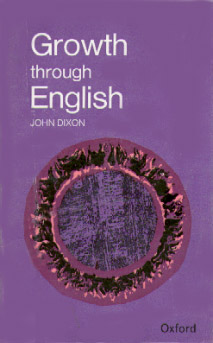
Shortly after its inception in 1963, NATE joined with the US National Council of Teachers of English (NCTE) and the Modern Languages Association (MLA) to secure funding for a month’s long seminar at Dartmouth College in New Hampshire. The plan – as John Dixon has written, perhaps surprising today – was that a group of 40 to 50 teachers in schools and universities would thrash out the fundamental questions about English teaching and, through their national associations, spearhead a new approach.
Delegates to the conference brought visions of English teaching that differed not only between but (in some cases) also within the participant territories. English teachers in the United States employed rhetorical models of expository writing that were less familiar to participants from the UK, several of whom brought to Dartmouth a tradition of close literary study originating largely from the Scrutiny-inspired Cambridge school. At the same time, delegates from the London Institute of Education, including James Britton and Harold Rosen, insisted on the importance of respecting and working with the language that children brought to the classroom as a starting point for development.
In the circumstances, it was necessary to find a principle of English teaching that would reconcile these divergent approaches to teaching and learning within the prevailing educational climate. The concept of “personal growth”, articulated by John Dixon of the UK delegation, provided a pedagogic ideal which most could support. It spoke both to the delegates’ awareness of wasted talent in the school-age population and to the zeitgeist that produced the human potential movement, R.D. Laing’s anti-psychiatry, and the Summer of Love of 1967. Fifty years on, it is still the principle of English teaching that gains the allegiance of a majority of practitioners. This is because the radical core of the concept of “personal growth” was the student’s own language.
This focus on the child’s language emphatically did not exclude or marginalise literature. Pupils’ written stories and poems, when shared and discussed, became “the literature of the classroom”. And delegates from both sides of the Atlantic were surprisingly united (Dixon writes) in their view of literary response: “The experience of art is a thing of our making, an activity in which we are our own interpretive artist.”
These formulations about students’ language and literary response were developed, amended and rewritten over the next half century in NATE publications and elsewhere. During these years, language study was reconstituted, insights from discourse studies of genre and narrative were assimilated, and technological change was incorporated into everyday classroom practice. The development of English studies over the last half-century demonstrates (in the words of Garth Boomer, a former president of the Australian Association for the Teaching of English) that the curriculum is no longer a prepackaged course to be taken; it is a jointly enacted composition that grows and changes as it proceeds. The view that the experience and language that the child brought the classroom was intrinsically important, and that the process of teaching English must start here – not merely to impose class-based notions of formality and correctness, but to work with students to expand their language, cognition and range of feeling: this is the legacy and the importance of Dartmouth.
This post is adapted from an article to be published in Teaching English. There will be a research symposium on Dartmouth on 26 June 2016 following the NATE Conference in Stratford on Avon.